“What is lyric thought for?” asks Jan Zwicky in Lyric Philosophy. “For the discernment of lyric truth – the nature of the timeless, unlanguageable, resonant reality.” In Katie Peterson’s sixth poetry collection, Fog and Smoke, every search for clarity and connections must proceed through the full awareness of what constrains us. In this halting procession of words, while making and listening, both the poet and the reader must submit to assessment. Whatever causes us to pause may afford a moment for extended, straining perception into the daunting density of actuality.
 In these poems, bay fog and wildfire smoke introduce the proximate causes of concern and uncertainty. But they mainly function as media for wonderment and utterance. The first long poem-in-parts, “Fog,” was occasioned by the pandemic – “I did inside what I had done / in the world.” The poem comprises a single extended speculation about how fog makes us thoughtful: “It is as lofty as they come. / It touches everyone. / It’s like God – it disappears. / It wants us to see ourselves. / Its absence is clear.” Fog, obscuring everything, becomes the insight-medium of both first and last resort. The impulse for consolation cancels itself with tentative, sometimes knotty insights; the insights are here to try to set things straight, not to inflate someone’s sense of self-worth. Let’s say you climb up above Berkeley to Tilden Park, above the fog: “It was not arranged for your benefit. / Inside, you couldn’t see in front of you. / Once above, you could only see a bank / covering what you usually knew.” The fog may inspire a wry self-regard:
In these poems, bay fog and wildfire smoke introduce the proximate causes of concern and uncertainty. But they mainly function as media for wonderment and utterance. The first long poem-in-parts, “Fog,” was occasioned by the pandemic – “I did inside what I had done / in the world.” The poem comprises a single extended speculation about how fog makes us thoughtful: “It is as lofty as they come. / It touches everyone. / It’s like God – it disappears. / It wants us to see ourselves. / Its absence is clear.” Fog, obscuring everything, becomes the insight-medium of both first and last resort. The impulse for consolation cancels itself with tentative, sometimes knotty insights; the insights are here to try to set things straight, not to inflate someone’s sense of self-worth. Let’s say you climb up above Berkeley to Tilden Park, above the fog: “It was not arranged for your benefit. / Inside, you couldn’t see in front of you. / Once above, you could only see a bank / covering what you usually knew.” The fog may inspire a wry self-regard:
It sailed in on its own damn time
like a director looking for a star
and finding only waitresses.
We auditioned for a year.
Fog and Smoke meditates on what is elemental in us and in the world — though the latter elements, fog and smoke, monosyllabically familiar, have been altered in some way. Have our own elements also changed? A person’s tone is elemental, but Peterson won’t surrender everything to the allure of tone. The heroic “I” momentarily forgets its name. Who is this person we walk beside while reading “The Walk to the Road, When Dinner Was Over”? She writes, “I walk alongside the barbed wire, grateful / for what I can’t control, / the alignment of your thoughts / with mine. It’s delicate.” Part Vergil, part Dante:
It is not advice I give you
but the kind of blessing that comes
from the bewildered heart – if you want to walk
through a field of flowers
you must also walk at night.
Part needle, part thread: One gesture punctures the materials, the other binds them: “Don’t blink. The beautiful / is sometimes the good. Don’t get / excited. Not all the time.” The beautiful is the orb in “The Supermoon”: “Its whiteness / disquiets.” “The Supermoon” is a mordant poem about childbirth, childcare, and the excessively bright but obtrusive light of signification that insists on mattering. The poem ends:
People think Emily got her name
from poetry, but her Korean father chose it
so his family could say it without trouble.
Trouble, such a beautiful word,
I wish we could say it with abandon.
Once I thought we all agreed on kindness.
Then I ripped a spiderweb
because of some unmanageable fear.
There’s no place for chopsticks
in an American drawer, my husband said.
I said, just try me. Just watch me try.
I’m American. I can put things anywhere.
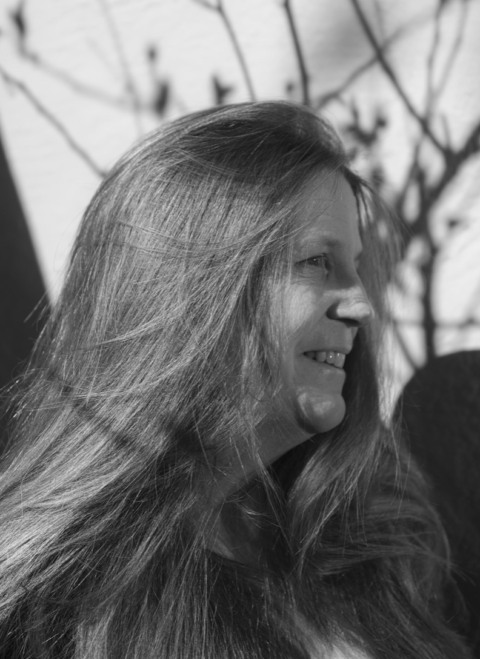 By mid-book, Fog and Smoke becomes familial in its concerns – or rather, the family appears within the smoke of supposition. But first, Peterson peers at “The Fire Map,” catastrophe made identifiable. “The map says it’s just 3 percent contained. / But like all numbers, these mislead, / as success isn’t about amount for those who fight / but some cessation of agility – if the fire can jump, / can they keep up?” The person thinking here has been trying to keep up with actuality since page one. Agility is the ability to move quickly and easily – the poems do that; they leap. Agility is the ability to think and understand quickly – the person in the poems is able to identify the location of fires, but “In no year does this map record our smoke.”
By mid-book, Fog and Smoke becomes familial in its concerns – or rather, the family appears within the smoke of supposition. But first, Peterson peers at “The Fire Map,” catastrophe made identifiable. “The map says it’s just 3 percent contained. / But like all numbers, these mislead, / as success isn’t about amount for those who fight / but some cessation of agility – if the fire can jump, / can they keep up?” The person thinking here has been trying to keep up with actuality since page one. Agility is the ability to move quickly and easily – the poems do that; they leap. Agility is the ability to think and understand quickly – the person in the poems is able to identify the location of fires, but “In no year does this map record our smoke.”
The spider’s web mentioned earlier (or one like it) returns in “The Web.” The mother is “trying to put / the child in the car” while glancing at the spider in her web. Or maybe this is another web and spider, ”what I am trying / not to destroy.” And since “Desire brings the child / and the spider / together,” one slip-up and the child is doomed.
I remember the tension
in the web, the focused
light, the way the spider
sat on top
of what she ate,
pairing one art with
a darker art,
killing exactly what
you need to live,
no more than that.
Part of this poet’s practice is dark as well — or occurs in and looks out from the umbra of unknowingness. At times her remarks are childlike. Why do we want to make art out of what disrupts and diminishes us? Why do we set out to help a child grow when it is uncertain what we grow into? How can a poet depict such questions in language sufficiently lucid to honor their universality – while sufficiently involuted to suggest the groping for answers and stability? But of course, the pleasure one may take in such provocations is why I follow and esteem Katie Peterson’s work.
[Published by Farrar Straus & Giroux on January 2, 2024, 709 pages, $36.00 US hardcover]
To read Ron Slate’s review of Katie Peterson’s Life in a Field (Omnidawn, 2021), click here.
* * *
Valérie Perrin’s debut novel, Forgotten on Sunday (Les Oubliés du Dimanche), appeared in 2015 and thrived as a best seller in France, but it was the success of her second book, Changer l’eau des fleurs (2019), published for anglophones in 2020 by Europa Editions as Fresh Water for Flowers, that triggered its translation and publication. I often wonder why certain books get translated, aside from the dictates of the market’s algorithm. French literary prizes attract the attention of American publishers, but as in America, major awards, especially in retrospect, prove inconsistent in their standards and intentions. In France, Leila Slimani’s banal but topical class-clash novel The Perfect Nanny received the Prix Goncourt in 2016 and came to the U.S. in 2019 – followed two years later by Nicolas Mathieu’s compelling and nuanced And Their Children After Them. The latter tells us much more about contemporary French lives than Slimani’s can’t-miss melodrama.
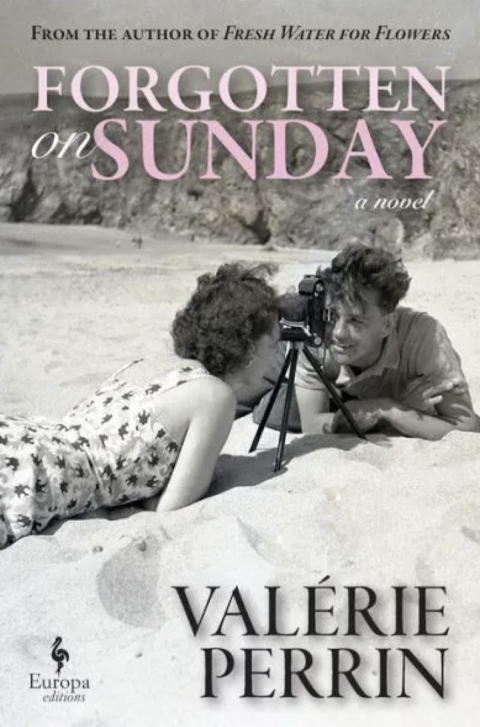 Perrin wrote the screenplay for Claude Lelouch’s film Un plus une (2015), and Forgotten on Sunday has the elements necessary for conversion to the screen – and none of the numinous or speculative effects of lyric prose. The story is narrated by 21-year old Justine Neige who works as an aide at The Hydrangeas, an assisted living facility, and lives close by with her grandparents and cousin in a village named Milly. The novel pivots between two plot-streams. First, Justine’s and her cousin’s parents were killed in a car crash in 1996 when she was four-years old; she now takes steps to learn more about what happened, since her grandparents won’t speak of it. Second, Justine is attached to one of the facility’s residents, Hélène Hel, whose life story is transcribed in pieces by Justine.
Perrin wrote the screenplay for Claude Lelouch’s film Un plus une (2015), and Forgotten on Sunday has the elements necessary for conversion to the screen – and none of the numinous or speculative effects of lyric prose. The story is narrated by 21-year old Justine Neige who works as an aide at The Hydrangeas, an assisted living facility, and lives close by with her grandparents and cousin in a village named Milly. The novel pivots between two plot-streams. First, Justine’s and her cousin’s parents were killed in a car crash in 1996 when she was four-years old; she now takes steps to learn more about what happened, since her grandparents won’t speak of it. Second, Justine is attached to one of the facility’s residents, Hélène Hel, whose life story is transcribed in pieces by Justine.
Perrin’s prose and dialogue are crisp. Since Justine is so young, one doesn’t expect flights of analysis, but clearly she is a formulator. She recognizes the airlessness of her home life and supplants it with curiosity about the past and the memories of the elderly. Perrin has revealed that early drafts of the novel were narrated by a seagull; in the finished version, a seagull unfailingly appears as a mascot for enduring affection in both Hélène’s story. That story looks back at the German invasion of France in 1940, Hélène’s work in a café and as a seamstress, and the arrest and disappearance of her lover Lucien.
In converting the narrator from seagull to young woman, Perrin left traces of the fanciful in the novel, but not enough to peg the book strictly as magical realism. Yet we are asked to accept that Justine sleeps with her attentive boyfriend “What’s-His-Name” but literally doesn’t know his name. Her renditions of the past are so aptly detailed and well-told that only in pausing might we remember to ask: how does she know all of this, beyond what has been told to her by an aged woman with increasing dementia and grandparents who suppress their memories? Forgotten on Sunday is driven by plot, and masterfully so – Perrin takes her time toward the tale’s pay-off. Perhaps Justine imagines some of her tale; perhaps she draws some of the passions and obsessions of her characters out of her own need. She says, “I find potential emotions crippling. Only things that can never exist interest me.” Maybe that’s a clue. While reading the novel, I was swept up in it — such is the power of Perrin’s convincing expression. Only after the final paragraph did I ask: what just happened?
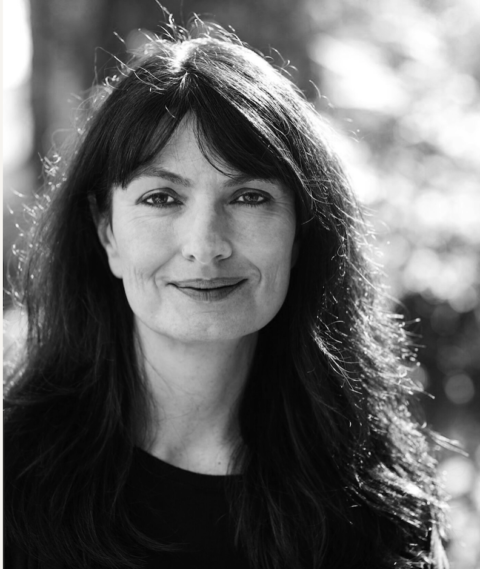 Justine says, “I dream of love, but as soon as it’s shown to me, it exasperates me. I become nasty and unbearable.” Maybe that’s why she invests so much in the passions and tales of others. And those stories are engrossing – Lucien’s fate, the pre-institutionalized life of Hélène and the appearance of her son at the nursing home, and the events leading up to the deaths of Justine’s parents. All of the novel’s components express an embedded brutality in the human psyche – both thwarted and realized desires for the Other bring disaster, and the Nazis are there to keep an old grudge pulsing. Only the seagull, it seems, preserves hope and love.
Justine says, “I dream of love, but as soon as it’s shown to me, it exasperates me. I become nasty and unbearable.” Maybe that’s why she invests so much in the passions and tales of others. And those stories are engrossing – Lucien’s fate, the pre-institutionalized life of Hélène and the appearance of her son at the nursing home, and the events leading up to the deaths of Justine’s parents. All of the novel’s components express an embedded brutality in the human psyche – both thwarted and realized desires for the Other bring disaster, and the Nazis are there to keep an old grudge pulsing. Only the seagull, it seems, preserves hope and love.
The residents of The Hydrangeas, those “forgotten on Sunday” by their families, tell stories that illuminate their lives. Once we’re in the novel’s harness, we adopt Justine’s urge to fashion the contours of those lifetimes – but Justine herself is an almost impenetrable stenographer, and refreshingly so in a way, since there’s no commoditized trauma-speak here begging to matter to us. But there is trauma. When the full scope her own family’s tragedy is revealed, one feels the impact as a surrogate. At that conclusion, Hildegarde Serle had my gratitude for having translated this novel.
[Published by Europa Editions on June 4, 2024, 304 pages, $28.00 US hardcover]
* * *
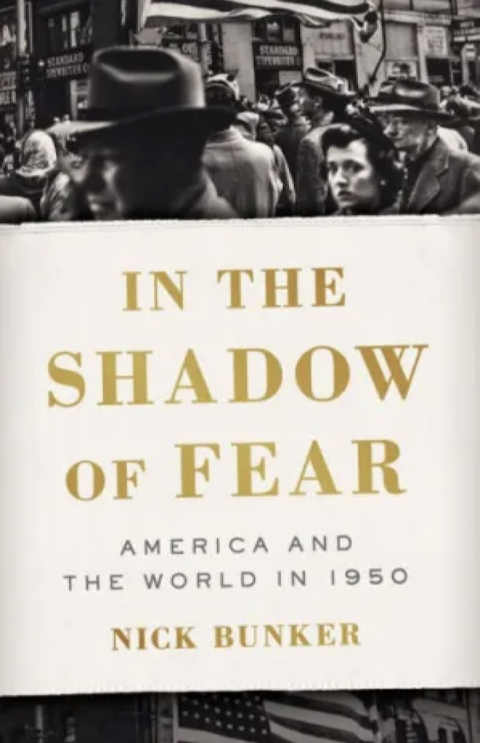 On the day I was born in 1950, the New York Times reported that Navy aircraft had destroyed 36 North Korean locomotives, high consumer demand for Packards was outpacing production, the board of the Screen Actors Guild had asked its membership to sign anti-Communist loyalty oaths, and Althea Gibson became the first person of color to play at the U.S. Nationals tennis tournament. A new war and Maoism, domestic productivity and labor relations, red-baiting, modest increments of social justice – welcome to Nick Bunker’s engaging In The Shadow of Fear: America and the World in 1950. “We are so used to thinking of 1945 as a great dividing line in history that other dates fade into obscurity beside it,” he writes. “It may be that the real moment of divisive change occurred much later, in those ten months between Labor Day 1949 and the beginning of the Korean War.”
On the day I was born in 1950, the New York Times reported that Navy aircraft had destroyed 36 North Korean locomotives, high consumer demand for Packards was outpacing production, the board of the Screen Actors Guild had asked its membership to sign anti-Communist loyalty oaths, and Althea Gibson became the first person of color to play at the U.S. Nationals tennis tournament. A new war and Maoism, domestic productivity and labor relations, red-baiting, modest increments of social justice – welcome to Nick Bunker’s engaging In The Shadow of Fear: America and the World in 1950. “We are so used to thinking of 1945 as a great dividing line in history that other dates fade into obscurity beside it,” he writes. “It may be that the real moment of divisive change occurred much later, in those ten months between Labor Day 1949 and the beginning of the Korean War.”
By 1950, the Democrats had dominated Washington for 18 years and had stitched FDR’s New Deal programs (with sufficient bipartisan support) into the fabric of American life. Harry Truman, Roosevelt’s last vice president, had won a surprise victory in the 1948 presidential election and attempted to extend those programs in his “Fair Deal” proposals – national health insurance, regulated agricultural pricing, equal rights for people of color, and the repeal of the Taft-Hartley “union busting” law. Looming over these domestic issues were the spread of Communist and Socialist influence including the “loss” of China and the Korean conflict, Russia’s successful test of an atomic bomb in 1949 (with purloined American technology), and debate over the cost of the Marshall Plan in Europe. Bunker converts all of this into a seamless, tense narrative with Truman struggling to maintain his centrist balance and balance his budget (politicians in both parties actually cared about deficits). On April 16, 1950, Truman announced that he would not run for a second term in 1952.
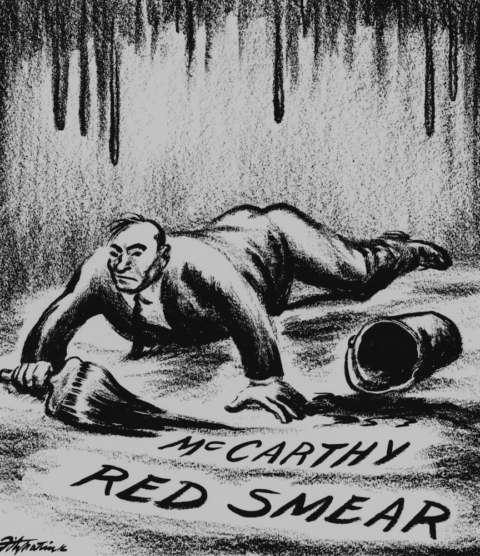 In the Shadow of Fear resonates now by way of its portrayal of the demise of centrism and the fracturing of the Democratic party, while Republicans realized that stoking alarm over the threat of internal enemies could win votes. Bunker writes, “It was the strangest of ironies that the most famous of the country’s anti-communist crusades would occur at just the moment when corporate America had the least to fear from such an enemy within.” So as U. S. Steel was erecting the largest plant it would ever operate, Joseph McCarthy took anti-Communism to its furthest extreme. As Bunker notes, McCarthy had not previously been a vocal critic of Truman’s policies, had supported the NATO treaty, and “was never much of an ideologue himself.” In 1936, he ran for district attorney as a New Deal Democrat. (Donald Trump was never much of an ideologue either. He liked to hang around New York lefties and attend Saturday Night Live after-parties.) But the Alger Hiss affair lit up headlines across the country, and McCarthy relentlessly attacked the State Department as a nest of spies and Communist sympathizers.
In the Shadow of Fear resonates now by way of its portrayal of the demise of centrism and the fracturing of the Democratic party, while Republicans realized that stoking alarm over the threat of internal enemies could win votes. Bunker writes, “It was the strangest of ironies that the most famous of the country’s anti-communist crusades would occur at just the moment when corporate America had the least to fear from such an enemy within.” So as U. S. Steel was erecting the largest plant it would ever operate, Joseph McCarthy took anti-Communism to its furthest extreme. As Bunker notes, McCarthy had not previously been a vocal critic of Truman’s policies, had supported the NATO treaty, and “was never much of an ideologue himself.” In 1936, he ran for district attorney as a New Deal Democrat. (Donald Trump was never much of an ideologue either. He liked to hang around New York lefties and attend Saturday Night Live after-parties.) But the Alger Hiss affair lit up headlines across the country, and McCarthy relentlessly attacked the State Department as a nest of spies and Communist sympathizers.
Bunker’s careful research yields illuminating sections on John L. Lewis and his union’s coal miners strikes, the fractious debates over involvement in Asia and funding Taiwan’s defense, and raising the ceiling on defense spending. Along the way we find apt portrayals of Truman’s secretary of state Dean Acheson, Robert Taft, the young Richard Nixon and other key figures, including Democratic big city bosses like Frank Costello whose exposed corruption tainted Truman. Meanwhile, inflation had dipped to 2 percent, new houses were being constructed at unprecedented rates, and between March and April of 1950 more than a million unemployed workers found jobs. And then, the Korean War began.
[Published by Basic Books on October 3, 2023, 496 pages, $35.00 US hardcover]